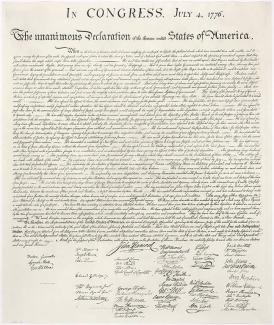U.S. Independence Day

Image: a version of the 1823 William Stone facsimile / Wikimedia Commons
United States Declaration of Independence
Origins of Independence Day
Independence Day commemorates the adoption of the Declaration of Independence on July 4, 1776, by the Continental Congress declaring that the 13 American colonies were no longer part of the British Empire.
The Declaration summarized the reasons the colonies were severing their political ties to Great Britain. July 2, 1776, is the day that the Continental Congress actually voted for independence. John Adams, in his writings, even noted that July 2 would be remembered in the annals of American history and would be marked with fireworks and celebrations. The written Declaration of Independence was dated July 4 but wasn't actually signed until August 2.
Cultural Significance
The Declaration captured the spirit of the newly independent nation. The eloquent words of the preamble set high expectations that continue to be challenged as our nation matures. “We hold these truths to be self-evident, that all men are created equal, that they are endowed by their Creator with certain unalienable Rights, that among these are Life, Liberty and the pursuit of Happiness.”
History reveals how this lofty document became the launching pad for the civil rights movement. The unalienable rights have been systematically denied to Black Americans as evidenced by the ongoing battles required to protect the right to vote, fair housing, jobs, education and other resources inherent in the right to the pursuit of happiness.
Eleven years after the Declaration of Independence was signed, the Constitution was signed by 39 of the 55 delegates on September 17, 1787. At least one delegate refused to sign because the Constitution codified and protected slavery and slave trade. After the Civil War technically freed enslaved Americans, Black Americans still were denied the rights of citizenship.
Implications for Ending Racism
On July 5, 1852, Frederick Douglass gave his famous speech “What to the Slave is the Fourth of July?” He refused to honor the Fourth of July but wanted to use the occasion to make people think about the fact that 76 years after the Declaration of Independence was ratified, Black Americans were still experiencing oppression, not freedom.
Ending Racism USA will continue to share historical information, real life stories and opportunities for engagement and advocacy to build bridges of understanding with others who share the belief and are willing to declare that we are all created equal and entitled to the rights embodied in our founding documents.
